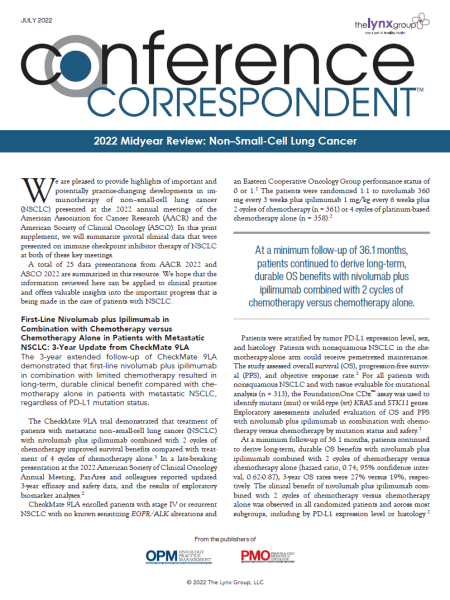The KRAS gene mutations can be identified in 20% to 30% of patients with non–small-cell lung cancer (NSCLC). The predictive benefit of KRAS status in NSCLC is still debated, and mutation subtypes may have an impact. Furthermore, KRAS mutations have been linked to enhanced PD-L1 expression and a high tumor mutation burden, suggesting that they may benefit more from an immune checkpoint inhibitor (ICI).1 ICIs have revolutionized the treatment of patients with NSCLC; however, not all patients benefit. The level of PD-L1 is used to predict treatment response but its accuracy is poor. Although KRAS plays a role in NSCLC carcinogenesis, the impact of KRAS mutations in patients receiving ICIs is unknown.2
As a result, a study was undertaken at an institution in Italy to investigate the influence of KRAS mutations on prognosis in patients with advanced NSCLC treated with ICI monotherapy.1 From January 2016 to March 2021, the study looked at data from 227 patients with advanced NSCLC who were treated with ICI monotherapy. In terms of progression-free survival (PFS) and overall survival (OS), the predictive influence of KRAS status was studied.1
In total, 169 patients with known KRAS variant status participated in the study. The majority (95%) of the patients had stage IV disease, 83% were smokers, and 83% had adenocarcinoma. In 25% of instances, PD-L1 status was negative, and 58% had a tumor proportionate score of ≤50%. KRAS mutations were found in almost 30% of the patients. Codon 12 mutation (N = 44; 25 patients with KRASG12C mutations) was the most common molecular change, followed by codon 3 (N = 4) and codon 61 (N = 2) mutations. The first-line treatment for 38% of patients was ICI monotherapy, whereas the second-line treatment for 15% of patients was ICI monotherapy after ≥2 previous treatment lines. Patients with KRAS mutations had longer OS (26.94 vs 12.02 months) and PFS (6.76 vs 3.84 months) than patients without KRAS mutations. There was no difference in OS or PFS between patients with KRASG12C mutations and those without KRASG12C mutations.1
In patients with NSCLC treated with ICI monotherapy, KRAS mutations are linked to a longer survival time, with no differences observed in the study between mutant subtypes.1 Sotorasib, a first-in-class KRAS inhibitor, has recently received accelerated approval by the US Food and Drug Administration for the treatment of adult patients with KRASG12C-mutated locally advanced or metastatic NSCLC who have received ≥1 previous systemic therapies.3
References
- Pelizzari G, Corvaja C, Targato G, et al. Prognostic impact of KRAS status in patients with non-small cell lung cancer (NSCLC) treated with immune checkpoint inhibitor monotherapy. Ann Oncol. 2021;32(suppl 5):S1011.
- Proulx-Rocray F, Routy B, Mohamed R, et al. The prognostic impact of KRAS, TP53, STK11, and KEAP1 mutations and the influence of the NLR in NSCLC patients treated with immunotherapy. J Clin Oncol. 2021;39(suppl 15):Abstract e21010.
- Amgen. FDA approves Lumakras (sotorasib), the first and only targeted treatment for patients with KRAS G12C-mutated locally advanced or metastatic non-small cell lung cancer. May 28, 2021. www.amgen.com/newsroom/press-releases/2021/05/fda-approves-lumakras-sotorasib-the-first-and-only-targeted-treatment-for-patients-with-kras-g12cmutated-locally-advanced-or-metastatic-nonsmall-cell-lung-cancer. Accessed December 9, 2021.

